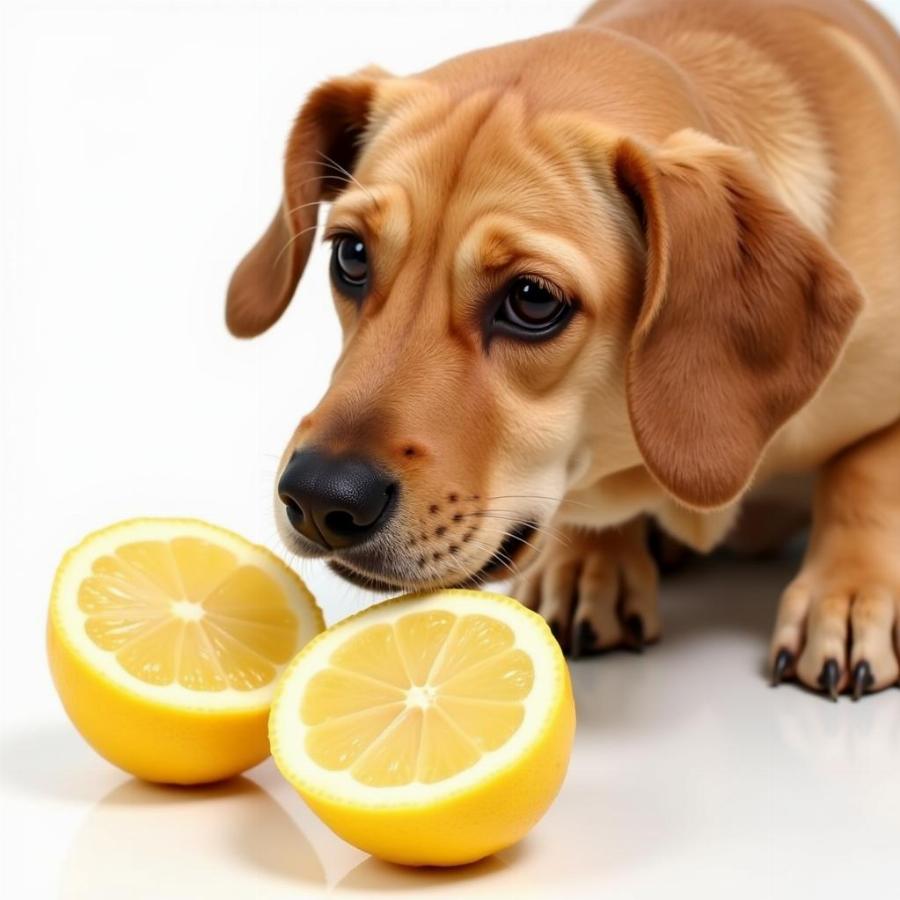Dogs rely heavily on their sense of smell, a world far richer and more complex than ours. While we might enjoy the scent of fresh flowers or a home-cooked meal, those very same smells dogs don’t like can be overwhelming or even repulsive to our canine companions. Understanding these smells is crucial for creating a comfortable and happy environment for your furry friend. Let’s explore the common smells dogs don’t like and how you can manage them effectively.
Unveiling the Smells Your Dog Detests
Many scents we consider pleasant are actually offensive to a dog’s sensitive nose. Citrus fruits, for example, are often used in cleaning products, but the potent smell of lemons, oranges, and grapefruits can irritate a dog’s respiratory system. Similarly, the strong aroma of vinegar, while natural and effective for cleaning, can be overwhelming for dogs. Other household cleaners, often laden with chemicals and artificial fragrances, can also be problematic.
 Dogs Sensitive to Citrus Scents
Dogs Sensitive to Citrus Scents
Certain spices, such as chili powder and cayenne pepper, are also smells dogs don’t like. These contain capsaicin, a chemical irritant that can cause burning sensations in their noses and mouths. Essential oils, while often touted for their therapeutic benefits for humans, can be toxic to dogs, especially when ingested or diffused in high concentrations. Tea tree oil, for example, can cause neurological problems in dogs.
Household Hazards: Smells That Pose a Danger
Beyond simple dislikes, some smells indicate potential hazards to your dog’s health. The pungent smell of ammonia, often present in cleaning products, can irritate a dog’s respiratory system. Mothballs, while effective at repelling insects, contain naphthalene, which is toxic to dogs and can cause vomiting, lethargy, and even seizures. If you suspect your dog has ingested mothballs, seek veterinary attention immediately.
The sweet, fruity smell of antifreeze, while attractive to dogs, can be deadly if ingested. Even a small amount can cause kidney failure. Keep antifreeze securely stored and clean up any spills immediately. Likewise, the strong odor of certain paints and varnishes can contain volatile organic compounds (VOCs) that can irritate a dog’s respiratory system and even cause long-term health problems. Ensure adequate ventilation when using these products and keep your dog away from freshly painted surfaces.
Why Do Dogs Roll in Grass? Unveiling the Mystery
Interestingly, while some smells repel dogs, others seem to hold an irresistible allure, leading to peculiar behaviors like rolling in grass, especially if it’s recently been cut. This action might seem strange to us, but why dogs roll in grass often relates to their instinctual desire to mask their own scent, potentially a throwback to their wild ancestors who used this tactic for hunting.
Identifying Your Dog’s Scent Sensitivities
Every dog is an individual, and their scent preferences can vary. Observe your dog’s behavior around certain smells. Does he turn his head away? Does he sneeze or cough? Does he leave the room? These are all signs that he finds the smell unpleasant. If your dog’s paws have a peculiar odor, it might be worth investigating. Sometimes, my dogs paws smell like fritos can be attributed to bacteria or yeast on their paws.
Creating a Smell-Safe Haven for Your Dog
Once you’ve identified the smells dogs don’t like, you can take steps to minimize their presence in your home. Opt for dog-friendly cleaning products with natural ingredients and avoid using strong air fresheners. Keep potentially hazardous substances like antifreeze and mothballs out of your dog’s reach. If you use essential oils, ensure they are dog-safe and diffuse them in well-ventilated areas, away from your dog. Consider that even something seemingly harmless like corn chips can be dangerous for dogs. Find out more about can dogs have corn chips before sharing your snacks.
Conclusion: Respecting Your Dog’s Sensitive Nose
Understanding the smells dogs don’t like is an essential part of responsible pet ownership. By creating a smell-safe environment, you can enhance your dog’s comfort and well-being. Remember, a dog’s sense of smell is far more acute than ours, so what might seem like a faint odor to us can be overwhelming for them. By being mindful of their sensitivities, we can strengthen our bond with our furry friends and ensure they live happy and healthy lives. If your dog mouth smells like garbage, or if your dog urine smells terrible, these could be signs of underlying health issues, and it’s best to consult with a veterinarian.
FAQ
-
What are some common household smells that dogs dislike? Citrus fruits, vinegar, ammonia, and certain spices.
-
Why are some essential oils dangerous for dogs? They can be toxic if ingested or diffused in high concentrations.
-
What should I do if my dog ingests antifreeze? Seek immediate veterinary attention.
-
How can I tell if my dog dislikes a particular smell? Observe their behavior – they might turn their head away, sneeze, cough, or leave the room.
-
What are some dog-friendly cleaning alternatives? Look for products with natural ingredients and avoid strong artificial fragrances.
Beaut Dogs: Your Trusted Source for Canine Care
Beaut Dogs is your one-stop destination for all things dog-related, offering expert advice, helpful tips, and a wealth of information on various breeds and their unique needs. From health and nutrition to training and grooming, we cover every aspect of dog ownership. When you need assistance, don’t hesitate to contact us via Email at [email protected] for detailed and accurate answers from Beaut Dogs. Visit https://beautdogs.com today to explore the wonderful world of dogs and learn how to care for them best!